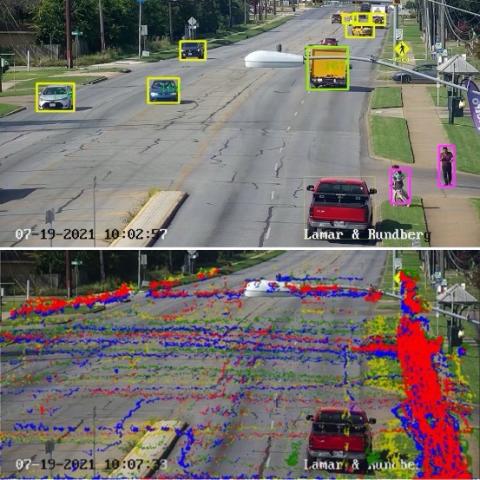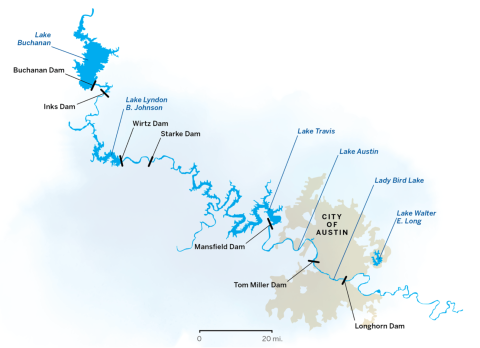A formalized partnership between City of Austin officials and researchers at The University of Texas at Austin has fast-tracked collaborations between the two entities to help find solutions to problems affecting us all – from improving road safety and ensuring water security to protecting Austin’s vibrant cultural scene.
The City of Austin and UT have a shared interest in improving our city. The history of partnership between the two goes back several decades. It has not always been a straightforward process though, given the size and bureaucratic complexity of each organization.
Since 2020, a new mechanism has been in place that helps make partnership easier, faster and more impactful. A master interlocal agreement (ILA) has streamlined the process for City officials to pair up with experts from UT to tackle issues that impact all Austin residents. In short, it simplifies things. The ILA was designed to facilitate collaboration by easing some of the paperwork burden and providing a normalized legal and administrative framework. This ensures projects can get started, and therefore be completed, in a timely fashion.
These collaborations have led to greater levels of safety, security and improved living conditions for residents of the Texas capital.
“The ILA contract structure allows for a greater degree of collaboration between staff and our research partners than might otherwise be available through traditional consulting contracts,” said Joel Meyer, acting transportation safety officer with the Austin Transportation and Public Works Department.
Vision Zero

Meyer works with UT researchers to help achieve the goals of the Vision Zero initiative – a strategy to end all traffic-related fatalities and serious injuries while also improving safe, healthy and equitable mobility for everyone in the city.
Transportation challenges account for the largest number of projects sponsored through the partnership.
I've worked with the City on a variety of projects for many years and before the ILA was in place, collaboration between UT and municipal departments required embarking on long and difficult application processes with no guarantee a proposal would come to fruition," said Randy Machemehl, professor of transportation engineering at UT’s Cockrell School of Engineering.
Much of Machemehl’s recent research has supported the City’s Vision Zero program: from data collection that has helped improve traffic signal timing in areas with increased commuter volumes, to extensive research aimed at improving road safety conditions for cyclists and pedestrians.
"Research completed through the ILA with UT has allowed the City's Vision Zero program to stay at the forefront of the rapidly evolving field of safety analytics and technologies," added Meyer.
Tapping into Water Expertise

Beyond transportation, the partnership has ensured City officials have access to the most advanced data on the City’s future water security needs, as well as expertise on the likelihood of extreme weather incidents in the future.
Zong-Liang Yang, a professor at the Jackson School of Geosciences, specializes in predicting extreme weather events such as droughts and floods. His expertise is being utilized by Austin Water to help ensure residents have access to the highest quality water now and in the future.
Yang, who is the lead principal investigator on the Water Forward Climate and Hydrology Analysis project, is an enthusiastic advocate for UT’s partnership with the City.

In particular, he noted the impressive level of engagement. "We work very closely together, meeting every two weeks,” he said. “This is a far more intensive level of engagement than many other collaborative projects I’ve been involved with."
Based on the best science available, Yang and his team are determining the need for new reservoirs and/or dams along the Colorado River to ensure water security for Austin until the end of the century.
In the next phase of the project, the team is looking at better predicting the unpredictable: extreme weather events such as flooding and drought. "The future climate in Austin is full of uncertainty," Yang said. “We’re trying to quantify that uncertainty."
Austin’s Culture
Water security and transportation are both crucial areas for the future of Austin. However, the city’s vibrant culture is also an area where expertise from the Forty Acres can play a role. Known as the ‘live music capital of the world,’ public, private and nonprofit sector organizations in Austin are working to ensure the welfare of local musicians is being met.
After extensive consultation with the Austin music community, UT’s Butler School of Music and the City’s Economic Development Department issued a report.
“It outlines the needs of local musicians with regards to affordability, access to healthcare and a number of other areas that are crucial to the future survival of our thriving music scene,” said Pat Buchta, CEO of Austin Texas Musicians, a nonprofit that supports and advocates for Austin musicians, and who was called upon to help inform the findings of the recent report.
“Since the pandemic, life has been very hard for Austin’s musicians who are struggling to make ends meet,” he said. “Austin Texas Musicians and other nonprofits support and advocate for this community. But we are not always heard. So we are delighted to be part of the conversation between the City of Austin and the University of Texas at Austin.”
The Tip of The ILA Iceberg
So far, the ILA has provided a framework for supporting nearly 50 projects that also address housing affordability, transforming the green economy, digital access, and the preservation of endangered local species. There are numerous other ongoing UT/City partner projects taking advantage of the ILA, all at different stages of completion. According to Meyer, the City’s acting transportation safety officer, many City departments now have access to top UT researchers who have been able to make timely, data-driven recommendations for policy and practice.
"The partnership with UT provides City staff an opportunity to co-develop research questions with leading experts and their students to support the City of Austin in answering questions that we don't always have the expertise or resources to address ourselves."

